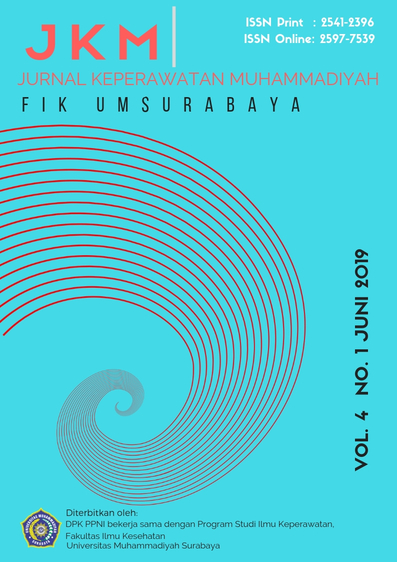Pengaruh Pelaksanaan Massage Terhadap Kecemasan Pada Ibu Nifas
DOI:
https://doi.org/10.30651/jkm.v4i1.16831Keywords:
anxiety, massage, postpartumAbstract
Objective: The postpartum period is a process of adaptation to physical and psychological changes. Anxiety is often ignored so that it goes undiagnosed. If this continues, it can cause postpartum psychological disorders. Massage intervention is one of the efforts to prevent and deal with psychological problems. This study aimed to determine the effect of giving massage with the effleurage technique on postpartum maternal anxiety.
Methods: This study used a pre-experimental research design with a one-group pretest-posttest approach. The population in this study were postpartum mothers who gave birth at Al-Aqsa 4 Room, East Java Province Haji Hospital, in March 2019. The sampling technique used was simple random sampling with 22 respondents according to inclusion and exclusion criteria. The intervention was given two times for two days for 15 minutes duration. The research instrument used was the Edinburgh Postnatal Depression Scale (EPDS). The statistical test used paired t-test with a significant value of the different tests (Sig. 2-tailed)
Results: The study’s results explained that the paired t-test result of 0.000 was less than 0.05. This shows a difference in the average value of anxiety before and after giving massage effleurage.
Conclusion: Performing massage effleurage treatment has a significant effect on reducing postpartum maternal anxiety. Massage therapy has been proven to be effective in relieving anxiety. In addition, massage effleurage can reduce levels of hydrocortisol, adrenaline, and noradrenaline that trigger anxiety.
References
Barthel, D., Kriston, L., Barkmann, C., Appiah-Poku, J., Te Bonle, M., Doris, K. Y. E., Esther, B. K. C., Armel, K. E. J., Mohammed, Y., & Osei, Y. (2016). Longitudinal course of ante-and postpartum generalized anxiety symptoms and associated factors in West-African women from Ghana and Côte d’Ivoire. Journal of Affective Disorders, 197, 125–133.
Bentelu, F. E. M., Kundre, R., & Bataha, Y. (2015). Perbedaan tingkat kecemasan dalam proses menyusui antara ibu primipara dan multipara di RS Pancaran Kasih GMIM Manado. Jurnal Keperawatan, 3(2).
Imura, M., Misao, H., & Ushijima, H. (2006). The psychological effects of aromatherapy-massage in healthy postpartum mothers. Journal of Midwifery & Women’s Health, 51(2), e21–e27.
Janiwarty, B., & Pieter, H. Z. (2013). Pendidikan psikologi untuk bidan suatu teori dan terapannya. Yogyakarta: Rapha Publishing.
Kuswandi, L. (2011). Keajaiban Hypno-Birthing: Panduan Praktis MelahirkanAlami. Lancar, & Tanpa Rasa Sakit, Pustaka Bunda, Jakarta.
Lonstein, J. S. (2007). Regulation of anxiety during the postpartum period. Frontiers in Neuroendocrinology, 28(2–3), 115–141.
Mok, E., & Woo, C. P. (2004). The effects of slow-stroke back massage on anxiety and shoulder pain in elderly stroke patients. Complementary Therapies in Nursing and Midwifery, 10(4), 209–216.
Nursalam & Pariani, S. (2001). Pendekatan praktis metodologi riset keperawatan. Jakarta: Sagung Seto, Hal, 68.
Pachtman Shetty, S. L., & Fogarty, S. (2021). Massage During Pregnancy and Postpartum. Clinical Obstetrics and Gynecology, 64(3), 648–660.
Rukiyah, A. Y., Yulianti, L., & Maemunah, L. S. (2009). Asuhan Kebidanan II (Persalinan). Jakarta: X, 195.
Stanhiser, J., & Steiner, A. Z. (2018). Psychosocial aspects of fertility and assisted reproductive technology. Obstetrics and Gynecology Clinics, 45(3), 563–574.
Sukmaningtyas, W., & Windiarti, P. A. (2016). Efektivitas endorphine massage terhadap tingkat kecemasan ibu bersalin primipara. Bidan Prada, 7(1).
Widyawati, M. N., Hadisaputro, S., Anies, A., & Soejoenoes, A. (2016). Effect of massage and aromatherapy on stress and prolactin level among primiparous puerperal mothers in Semarang, Central Java, Indonesia. Belitung Nursing Journal, 2(4), 48–57.
Wiknjosastro, H. (2009). Ilmu Kebidanan. Edisi ke 4 Cetakan ke 2. Jakarta: Yayasan Bina Pustaka Sarwono Prawirihardjo.
Yim, I. S., Glynn, L. M., Schetter, C. D., Hobel, C. J., Chicz-DeMet, A., & Sandman, C. A. (2010). Prenatal β-endorphin as an early predictor of postpartum depressive symptoms in euthymic women. Journal of Affective Disorders, 125(1–3), 128–133.
Zanardo F. Favaro D. Faggian M. Plebani F. Marzari F. Freato V, S. N. (2001). Effect of postpartum anxiety on the colostral milk β-endorphin concentrations of breastfeeding mothers. Journal of Obstetrics and Gynaecology, 21(2), 130–134.
Downloads
Published
Issue
Section
License
- Penulis tetap memegang hak atas karyanya dan memberikan hak publikasi pertama kepada jurnal ini yang secara simultan karya tersebut dilisensikan di bawah:Â Creative Commons Attribution-ShareAlike 4.0 International (CC BY-SA 4.0)













